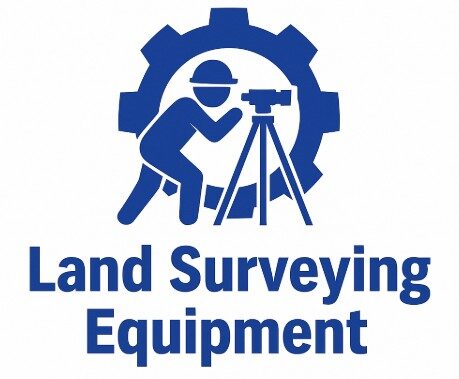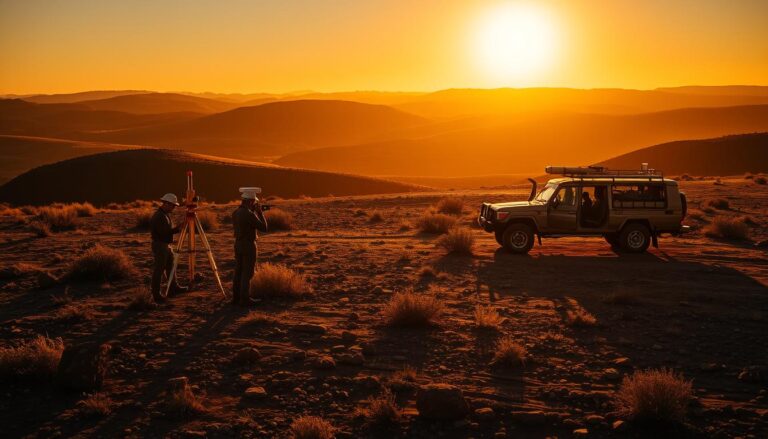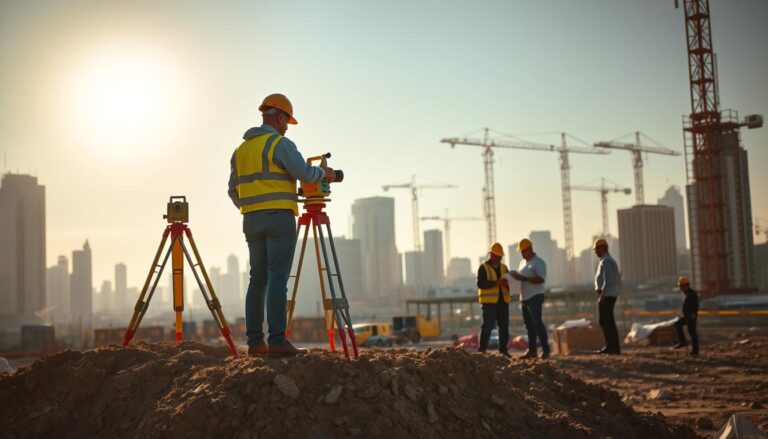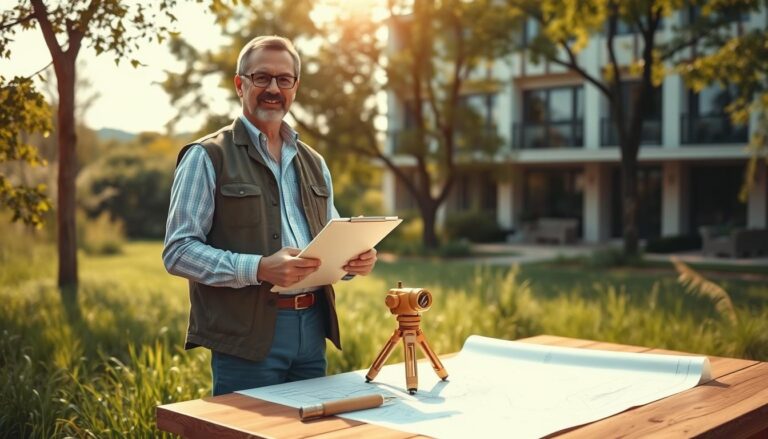The Hardest Lesson I Learned in My First Year as a Land Surveyor
Becoming a land surveyor was a dream come true, but it wasn’t without its challenges. In my first year on the job, I faced many obstacles. These challenges tested my resolve and taught me valuable lessons.
One of the biggest challenges was balancing the demands of the job with my physical and mental well-being. I learned that hard work and dedication are key. But so is avoiding burnout.
Through my experiences, I’ve learned the importance of working well with others. I also learned how to manage job stresses. These lessons have shaped my career as a land surveyor.
Key Takeaways
- Balancing work demands with personal well-being is crucial.
- Hard work and dedication are essential for success.
- Learning to manage stress is vital in a demanding field like land surveying.
- Effective teamwork is key to overcoming challenges.
- Practical experience is invaluable in shaping a land surveyor’s career.
My Journey into the World of Land Surveying
Looking back, I remember the curiosity and challenge that led me to land surveying. It’s a job that needs precision, patience, and a sharp eye for details. This field is both old and new, using traditional methods and the latest technology.
What Drew Me to This Ancient Profession
I was drawn to land surveying because of its mix of science, tech, and outdoor work. I wanted to play a key role in building infrastructure and protecting the environment. The chance to work on various projects, from buildings to nature, excited me.
What really caught my attention was:
- The chance to work outside and see different places
- The challenge of accurate measurements and data analysis
- The joy of helping with big projects that help communities
These reasons made land surveying a great career choice for me. It offered technical challenges and personal rewards.
The Gap Between Classroom Theory and Field Reality
Going from studying to real-world work was a big step. I learned a lot in class about surveying, but applying it in the field was tough. I faced issues like bad weather, hard terrains, and broken equipment. I had to be flexible and solve problems quickly.
Key lessons learned during this time include:
- The value of teamwork and clear communication in the field
- The need to be flexible when planning and doing surveys
- The importance of experience and ongoing learning to bridge the gap between theory and practice
These lessons have helped me grow as a land surveyor. They taught me to be resourceful and proactive when facing challenges.
Early Days in the Field: Expectations vs. Reality
The early days in the field were a wake-up call. I faced challenges that tested my skills and resolve. As a new land surveyor, I was eager to apply what I learned in class. But, I soon found out the job was much more complex than I thought.
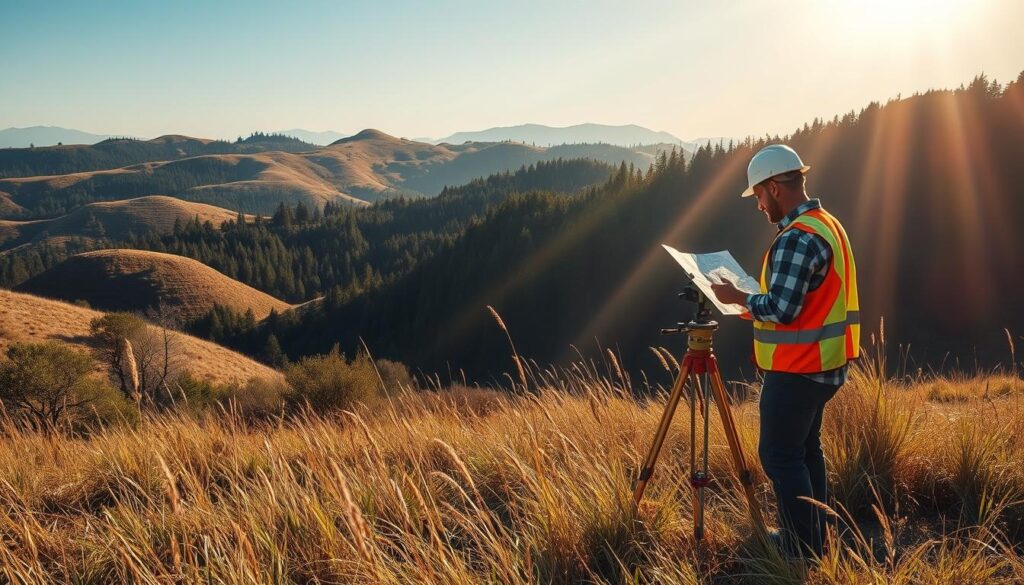
My expectations were quickly shattered. I encountered many technical challenges. The equipment, though advanced, needed skills I hadn’t developed yet. I struggled with using the total station and GPS, and understanding the data they gave me.
Technical Challenges That Blindsided Me
The technical challenges I faced were many. I had to deal with equipment calibration issues, data processing errors, and software compatibility problems. These issues made my work slow and affected my survey’s accuracy. I had to learn troubleshooting skills quickly to fix these problems.
- Equipment calibration issues
- Data processing errors
- Software compatibility problems
Weather, Terrain, and Other Unpredictable Variables
Weather and terrain also posed challenges. Bad weather, like heavy rain or extreme heat, often stopped my surveys. Difficult terrain, like dense forests or swampy lands, was another obstacle. I learned to be flexible and adjust my plans based on weather and terrain.
- Assessing weather conditions before heading out to survey
- Choosing the right equipment for the terrain
- Developing contingency plans for unexpected weather changes
The Hardest Lesson I Learned in My First Year as a Land Surveyor
Looking back, my first year as a land surveyor taught me a hard lesson. I was eager to use what I learned in school. But, I quickly found out that real-world surveying is much more complex.
Adapting to changing situations was a big challenge. This included weather, terrain, and project changes. One such moment changed how I approach surveying forever.
The Pivotal Moment That Changed Everything
It happened on a tough terrain project. Despite careful planning, we hit a snag. This taught me the value of flexibility and effective communication in surveying.
- The need to reassess and adjust plans in response to new information or changing circumstances.
- The value of clear and timely communication with team members, clients, and stakeholders.
- The importance of maintaining a calm and professional demeanor under pressure.
This experience showed me that even with the best plans, surprises can happen. How we handle these surprises is what matters.
Why This Lesson Transformed My Approach to Surveying
This lesson changed how I survey in several ways. It taught me to be more adaptable and resilient when faced with challenges. I started anticipating problems and planning for them, which reduced stress and boosted our team’s performance.
- I began to prioritize tasks more effectively, focusing on the most critical elements of a project.
- I improved my communication skills, ensuring that all stakeholders were informed and aligned with project developments.
- I adopted a more flexible mindset, recognizing that change is an inherent part of the surveying process.
By making these changes, I not only avoided common mistakes but also improved the quality and speed of my work. This experience has been invaluable, and I still use these lessons in my career as a land surveyor.
The Human Element: Working With Different Personalities
The land surveying profession is about people as much as it is about precise measurements. My first year showed me that dealing with different personalities was as tough as learning the technical skills.
Navigating Relationships With Veteran Surveyors
Working with veteran surveyors was a big challenge. Their experience was invaluable, but it was hard to earn their respect without losing my own.
Earning Respect Without Sacrificing Self-Worth
Showing a willingness to learn and listen was key to gaining respect from my colleagues. Being genuinely interested in their experiences and insights built trust and deepened my understanding of the field.
Learning From Experience Without Being Micromanaged
Finding the right balance between seeking guidance and being independent was crucial. Embracing autonomy in my work allowed me to grow without feeling trapped.
Building Trust With Clients and Property Owners
Building trust with clients and property owners was vital. It wasn’t just about being technically skilled but also about effective communication and managing disputes.
De-escalating Tense Property Disputes
When disputes happened, staying calm and professional was essential. By listening and explaining the surveying process clearly, I often managed to calm tense situations.
Communicating Technical Information to Non-Technical People
Learning to explain complex technical information in simple terms was a skill I developed. Using analogies and simple explanations helped clients and property owners understand the surveying work.
My first year taught me the value of interpersonal skills in land surveying. By mastering the human element, I built strong relationships and delivered great results for my clients.
As I keep working in this field, I realize that the art of working with people is as important as the science of land surveying. Combining technical skills with strong interpersonal abilities has allowed me to achieve more than I ever thought possible.
The Surprising Importance of Communication Skills
My first year as a land surveyor taught me a big lesson. Communication is key to success. It’s not just about knowing how to do the job. It’s about making sure projects are done on time and everyone knows what’s happening.
Starting in the field, I faced many challenges. But it was my communication skills that often saved the day. Being able to talk clearly and work well with others made all the difference.
When Technical Expertise Wasn’t Enough to Solve Problems
There were times when my technical skills weren’t enough. That’s when I learned to use my communication skills. For example, in a boundary dispute, I had to talk to property owners to find a solution.
Good communication helped me set clear expectations and build trust. By listening well and speaking clearly, I could handle tough situations and get good results.
How I Developed Better People Skills on the Job
Getting better at working with people took time and effort. I watched how experienced professionals interacted and asked for feedback. This helped me improve my communication skills.
Being open to feedback and eager to learn helped me become a better land surveyor. I learned to adjust my communication style for different situations. This skill has been very useful in my career.
Recognizing and Preventing Burnout in Surveying
Land surveying was tough on my body and mind in my first year. Looking back, I see that burnout was a big risk I didn’t prepare for well enough.
The Warning Signs I Initially Ignored
I was so focused on learning and doing well that I missed the signs of burnout. It wasn’t until I hit a wall that I understood how serious it was.
Physical Exhaustion and Its Impact on Decision-Making
Physical exhaustion was the first sign I noticed. Long hours and the hard work of surveying left me tired. This tiredness made it hard to make good decisions and focus.
Mental Fatigue and Diminishing Passion
Mental fatigue was another issue. The stress of deadlines and complex tasks made me lose my passion. I felt like I was just doing things without any joy or purpose.
How Burnout Affected My Work Quality and Relationships
Burnout made my work quality drop. I made more mistakes, and my relationships with others suffered.
Mistakes That Could Have Been Avoided
I made mistakes because I wasn’t alert and focused. These mistakes hurt my work and the team’s performance. It was a hard lesson, but it showed me the need for a healthy work-life balance.
The Ripple Effect on Team Dynamics
Burnout’s effects weren’t just on me; it also hurt the team. My colleagues had to do more, and our team’s mood suffered. It was tough, but it taught me to talk about my struggles and ask for help when needed.
Creating Healthy Boundaries and Sustainable Practices
Setting healthy boundaries and practicing sustainability were key to my success as a land surveyor. This job is demanding, needing more than just technical skills. It requires a balance between work and life.
Learning to advocate for myself was crucial. I had to understand my needs and communicate them well to my team and clients.
Learning to Advocate for Myself Without Burning Bridges
Advocating for myself didn’t mean being confrontational. It was about finding a balance. I wanted to stand firm on my needs while keeping good relationships.
Some strategies I found helpful were:
- Clearly telling clients and team members about my availability and workload.
- Setting realistic expectations for project timelines and what needs to be done.
- Prioritizing tasks to manage stress and workload better.
Using these strategies helped me keep healthy boundaries without harming my professional relationships.
Building a Sustainable Approach to a Demanding Career
Being sustainable in land surveying is more than setting boundaries. It’s about adopting practices that last. Some sustainable practices I used were:
- Keeping up with the latest technologies and methods to work more efficiently.
- Continuously learning and improving my skills.
- Working in a team to share knowledge and avoid burnout.
By focusing on sustainability, I kept my passion for land surveying alive. I also delivered high-quality results.
Looking back, creating healthy boundaries and adopting sustainable practices were crucial. These actions improved my work-life balance and job satisfaction.
Wisdom for New Surveyors: What I Wish I’d Known
Looking back, I wish I knew some key things when I started as a land surveyor. Success in this field isn’t just about knowing how to survey. It also needs soft skills and personal traits.
When I first joined, I learned how important teamwork is. Essential people skills like talking well, understanding others, and solving problems are key. They help reach project goals and keep a good work atmosphere.
Essential People Skills for Surveying Success
Building strong relationships with everyone you work with is crucial. You need to explain complex surveying stuff simply. Also, listening to feedback and concerns is vital.
Working with clients means knowing what they want and need. You have to manage their hopes and expectations well. This includes talking about project times, costs, and what you’ll deliver, all while being professional.
Resources and Strategies That Helped Me Thrive
Having the right tools and strategies is key for success in land surveying. This means keeping up with new tech and following the best practices and rules in the field.
Resources like professional groups, online forums, and training have been a big help. They’ve improved my skills and given me chances to grow professionally.
- Professional associations like the American Congress on Surveying and Mapping (ACSM) have been invaluable for staying current with industry developments.
- Online forums and discussion groups have provided a platform for sharing knowledge and experiences with peers.
- Training programs and workshops have helped me to develop new skills and stay abreast of emerging trends in the field.
Conclusion: Transforming Challenges into Growth
My time as a land surveyor has changed me a lot. I’ve learned about sticking with it, working together, and taking care of myself. Looking back, I see that it’s not just about knowing how to do the job. It’s also about dealing with people and handling the job’s physical and mental sides.
Working with people from all walks of life has taught me a lot. I’ve learned to be understanding, listen well, and communicate clearly. Building trust with clients and colleagues has helped me grow a lot. Also, knowing when to take a break to avoid burnout has kept me healthy.
If you’re starting a land surveyor career, here’s what I’ve learned. Be ready to change, always be open to learning, and take care of your body and mind. This way, you can turn challenges into chances to grow, just like I did.
